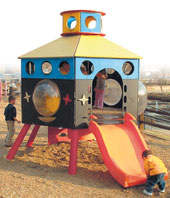 |
| Ground reality: Standardisation of play schools is the need of the hour |
If your child is in desperate need of some activity and you can’t see a park around, send the little one to a play school. But not before you check the deal on offer.
Sanghamitra Singha Roy’s 14-month-old child goes to a play school. Ask her if she is happy with the school her child goes to and she is at a loss. Like most parents, Roy knows nothing about the technical requisites of a play school.
Mother of a two-year-old, Shama shifted base from a remote village to a semi-urban area. She was anxious to get her child enrolled in a play school. It is, many parents believe, the stepping stone to a good English medium school, modelled as it is on a western concept. Shama too believed the play school would help her daughter gear up for the larger battle ahead. But then, like Sanghamitra, she too is clueless about the basic standards of a play school.
Mohua Ghosh, consultant psychologist points out, “It is imperative that play schools appoint competent teachers who can handle children. This is the stage where children should be taught the basics of socialisation and develop self-esteem. Without proper guidance, children can become aggressive, turn into bullies or develop a phobia about school. The ambience of a play school should be relaxed and happy so that the child feels at home and has a sense of companionship.”
But in most play schools in and around Calcutta, the ambience is far from child-friendly. Play schools are mushrooming by the dozen and some barely have any elbowroom, let alone an accreditation.
Says Krishna Damani, spokesperson, South Point School, Calcutta, “Parents send their little ones to play schools, so that they can be groomed early. Even if there are no benchmarks, some form of accreditation should be made imperative.”
There are a few, however, who have taken the initiative to improve the situation. Poonam Jain, president of the Montessorians of Calcutta ? an association of 35 to 40 Montessori schools ? is a case in point. Although her efforts are still to be rewarded, she hasn’t given up hope. “We are working towards some kind of standardisation of play schools and nurseries. This way, parents will at least know what to expect,” she says optimistically.
But parents too have to take responsibility in the scheme of things. As Jain points out, parents often pressurise teachers to take tests at an age when the child should actually be learning eye-hand co-ordination, rather than have his or her mental faculty tested. So teachers on their part are forced to give in.
A. Ravi, who runs the Pussy Cat School on the lines of a kindergarten feels, “The central government regulation of admitting children into nursery classes at 3+ has prompted parents to send their children to play schools at 1+.”
The common misconception is that since kindergartens are merely stepping stones, they don’t need any affiliation. Raj Sethia of the Learner’s Park rues, “This is a grey area in Indian legislation. There is no regulatory body, no quality control when it comes to play schools, nurseries, or Montessories. It is an open field.”
The problem, however, cannot be restricted only to technical requisites. Much of it revolves around human elements like emotional security as well as a sense of comfort. As Amit Chakraborty, city psychologist, stresses, “Since children suffer from separation anxiety at this stage, they should be handled by mother figures.” Besides, each child needs individual attention. The same set of rules cannot be applied to all in a uniform pattern.
For instance, an aggressive child needs to be handled differently from one who is withdrawn or outspoken. But all is not lost. As Prabir Basu of the Consumers’ Guidance Forum assures, “Although not regularised, these play schools are offering services ? in terms of imparting education and taking serious responsibility ? in exchange for money. So if the services are not provided, parents can seek redressal in consumer courts.”
But the question that still remains is whether these schools have the infrastructure and manpower to handle little children with care. Gurpreet Kaur Sethi, principal of My Montessori and Playhouse, candidly admits, “The problem is those who initiate a Montessori school do it more as a commercial venture with little or no scientific approach to education.” And most of these ventures pay rich dividends. As Vani Kapoor of Uttam’s Little Buds explains, “The nuclear family structure has led to the need for play schools. And that is what prompts parents to admit their children to any play school at hand without checking out its credentials.”
The onus then lies mostly on the parents. If they do their homework before admitting their children into anything that goes by the name of a play school, that will not only serve to benefit the child but will also ensure that such schools equip themselves to handle tiny tots.
cardinal rules
What every play school must do:
• Encourage games and extracurricular activities
• Give each child individual attention
• Encourage teachers to be approachable
• Have enough toys for the children to play with
• Appoint trained teachers
• Restrict the number of students
• Maintain hygiene
• Offer an atmosphere that exudes warmth
• Not force the child to study
• Not take tests, even if parents insist










